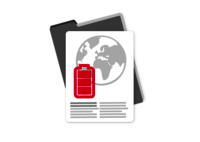As the lawyers at Noerr report, the new version of the Chemicals Sanctions Ordinance (ChemSanktionsV), which came into force on 18 January 2025, brings important changes for producers, importers and sellers of products when dealing with perfluorinated and polyfluorinated alkyl compounds (PFAS). These substances, known for their water, oil and dirt-repellent properties, are contained in numerous consumer products such as cosmetics and textiles. Due to their high persistence, however, they pose considerable risks to the environment and health, which is why they are already regulated by the EU REACH and POP regulations.
The new ChemSanktionsV closes a previously existing gap in criminal liability that had arisen due to references to ordinances that are no longer valid. Offences against the substances listed in the POP Regulation, including PFAS, are now regulated in Sections 10 and 11 of the ChemSanktionsV. Infringements can have the following consequences:
- Criminal sanctions: Intentional or negligent offences, such as the manufacture, placing on the market or use of PFAS, can be punished with fines or prison sentences of up to two years. In the case of consumer goods such as toys, packaging or cleaning and care products, there is a risk of imprisonment of up to three years; in the case of health hazards, even up to five years. Attempts to commit such offences are also punishable.
- Penalties under fine law: Violations in the waste management of substances listed in Annex IV of the POP Regulation can be penalised with fines of up to 50,000 euros.
It is therefore essential for companies to ensure compliance with the stricter regulations in order to avoid severe sanctions. trade-e-bility offers an inexpensive marketability test for PFAS and other harmful substances, especially for sellers and producers of toys.
The trade-e-bility consulting team will be happy to answer your questions about PFAS at +49/40/750687-300 or sales@trade-e-bility.de.

